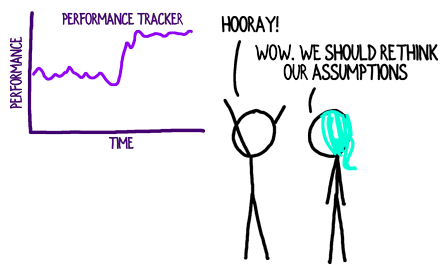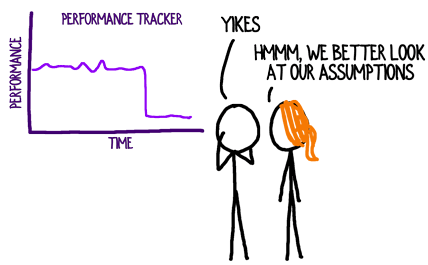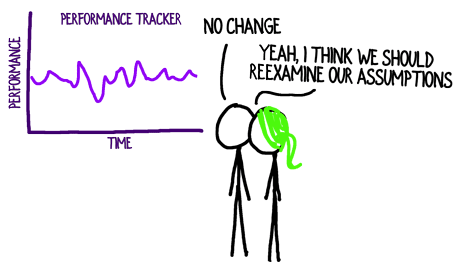You throw your best efforts into delivering value for your consulting clients, improving your consulting firm’s marketing, and creating a rewarding consulting environment.
Then you find your work was off by a bit. Or more than a bit. Or completely wrong. Pickles-in-peanut-butter wrong.
That’s no fun.
Alas, I have bad news for you and me: we’re mistaken. About everything.

I also have good news: our mistaken assumptions represent a huge opportunity for our consulting firms.
In the 1970s, IBM engineers viewed personal computers as a fad, because they knew centralized computing power and efficiency would always outstrip individual nodes.
Their prediction was wrong, obviously. You and every other reader have at least one personal computer.
But believing that IBM’s prediction was wrong is, well, also wrong. You and every other reader are moving more and more of your computing to the cloud, which is just a new form of centralized computing.
The fact is, you constructed your consulting firm on a raft of assumptions. Your strategy, your marketing, your delivery engine, and your operations all stand on beliefs and premises.
And every single assumption has failed or will fail. It’s only a matter of when.
Some assumptions are safe, of course: gravity attracts two masses to each other, every day lasts 24 hours, and lox doesn’t belong on a cinnamon raisin bagel.
Except that gravity fails at the quantum particle level, a consultant traveling across time zones can add hours to his day, and my older son will only eat lox on cinnamon raisin bagels. (Blech!)
You can’t easily challenge every single aspect of your consulting firm every day or you’ll never make progress.
Instead, let nine signals direct your attentions to assumptions which, if you challenge them, could transform your consulting practice.
Unexpected Success Signals
Over the past 12 months, what were your consulting firm’s three biggest, most unexpected successes?
What went right that you hadn’t anticipated?
Therefore, what assumption(s) that you had made prior to the unforeseen win, turned out not to be true?

Unexpected Failure Signals
Over the past 12 months, what were your consulting firm’s three biggest, most unexpected failures?
What went wrong that you hadn’t anticipated?
Therefore, what assumption(s) that you had made prior to the unanticipated missteps, turned out not to be true?

Closely Held Belief Signals
Over the past 12 months, what were the three rules, laws, principles and/or frameworks you espoused most loudly, vociferously and publicly. The ideas you tell your consulting clients with absolute certainty.
What assumptions prop up your closely held beliefs?
What would happen if you admit your prior, public proclamations were wrong, and turn your back on your prior successes like Wynton Marsalis walking away from classical music performances?
For example, I loudly proclaimed for years that every consulting sale starts by finding a problem that clients find urgent and expensive to leave unsolved. But that’s wrong.
Your consulting sale starts with the belief that you have the wherewithal to deliver value if the prospect were to buy your offering. Without that belief, most consultants won’t even try to make a sale.
Testing your most precious assumptions creates the greatest opportunities for your consulting firm to experience a transformational breakthrough.

Now that you’ve used nine signals to flag assumptions that may not be true or that anchor your consulting firm’s work, you can proceed with two transformation questions.
Two Transformation Questions:
- Can you extrapolate or generalize from your learning; i.e., if you didn’t already hold your current assumption, would you come to the same conclusion based on evidence now?
- Would shifting your assumption fundamentally alter your consulting firm’s strategy, how you win consulting projects, how you deliver value to your clients or how you run your consulting business?
Have you ever changed your consulting firm’s fundamental assumptions?
Text and images are © 2024 David A. Fields, all rights reserved.

 David A. Fields Consulting Group
David A. Fields Consulting Group 

Wow! Clicking the money bag trick is very cool!
Nice work!
Happy Holidays,
Frank
Ps we refer to you often in our client building efforts…winning more engagements thanks to you!
Hooray for winning more engagements! Your firm has an impressive group responsible for business development, and anything that adds to your money bags is a good by me. I appreciate you weighing in with holiday wishes too, Frank!
I often find myself thinking about my own biases and how they affect my decision making, so this post struck a chord. I think taking the time to slow down and examine assumptions you’re making is a great tip. Also, taking the time to sit with your team and hear what assumptions they’re all operating under can be very eye opening. Thanks!
Good on you (and your team) for being willing to challenge your assumptions. It sounds easy but in reality it’s extremely hard. Particularly with those assumptions that we hold dearly and have professed loudly.
I’m impressed with your dedication to thinking about your biases, and appreciate you offering your experience as a case study, Steve.
I think it was Mark Twain that said, “it’s not what you don’t know that hurts you most; it’s what you know for sure that just isn’t so.” By the way, this is a great quote to use with your clients- it gets them thinking!
Absolutely love that addition, Joe. Mark Twain was as wise as he was funny. Thanks for passing along his wisdom.
I used to think that sales could solve anything. Revenue slowdown? Just sell, sell, sell baby! Last year that premise proved to be wrong. There may be fundamental flaws in a business or product that sales can’t fix, or marketplace issues outside of the control of (even the best) sales professionals. I still believe in sales, but have come to see that it is not omnipotent. Humbling but true …
Wow, Bill, thank you for sharing that fundamental shift in assumptions. That’s definitely a big one! The old saying is that revenue covers a multitude of sins, but when the revenue drops, the sins appear.
I’m really glad you were open with your humbling revelation and change, Bill. A lesson to us all.
This is an old conversation about being powerfully persistent (working based on assumption until they come true) and foolishly stubborn (keeping assumptions that had to be dropped years ago).
I do not know a logical way to reliably determine the fine line between these two strategies. I rely on my gut/intuition alone.
You’re right Anatoli, that there’s always confusion between pressing on through “the dip” that knocks out most people prematurely, and wisely abandoning an unprofitable course.
By and large, the questions outlined above have proven to be a good way to surface the assumptions, then market feedback can help inform whether persisting or abandoning is the better next step.
Thanks for expanding the conversation!